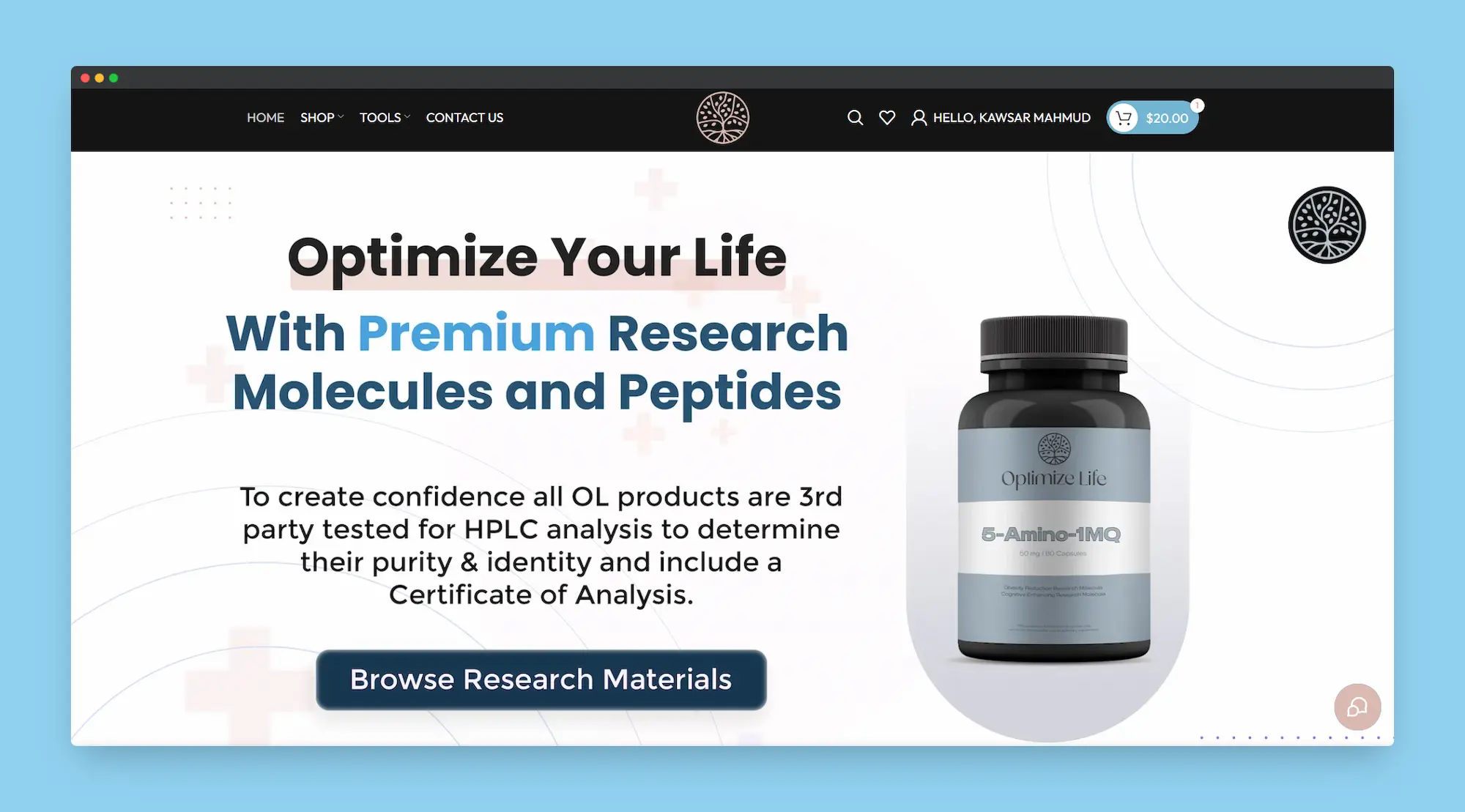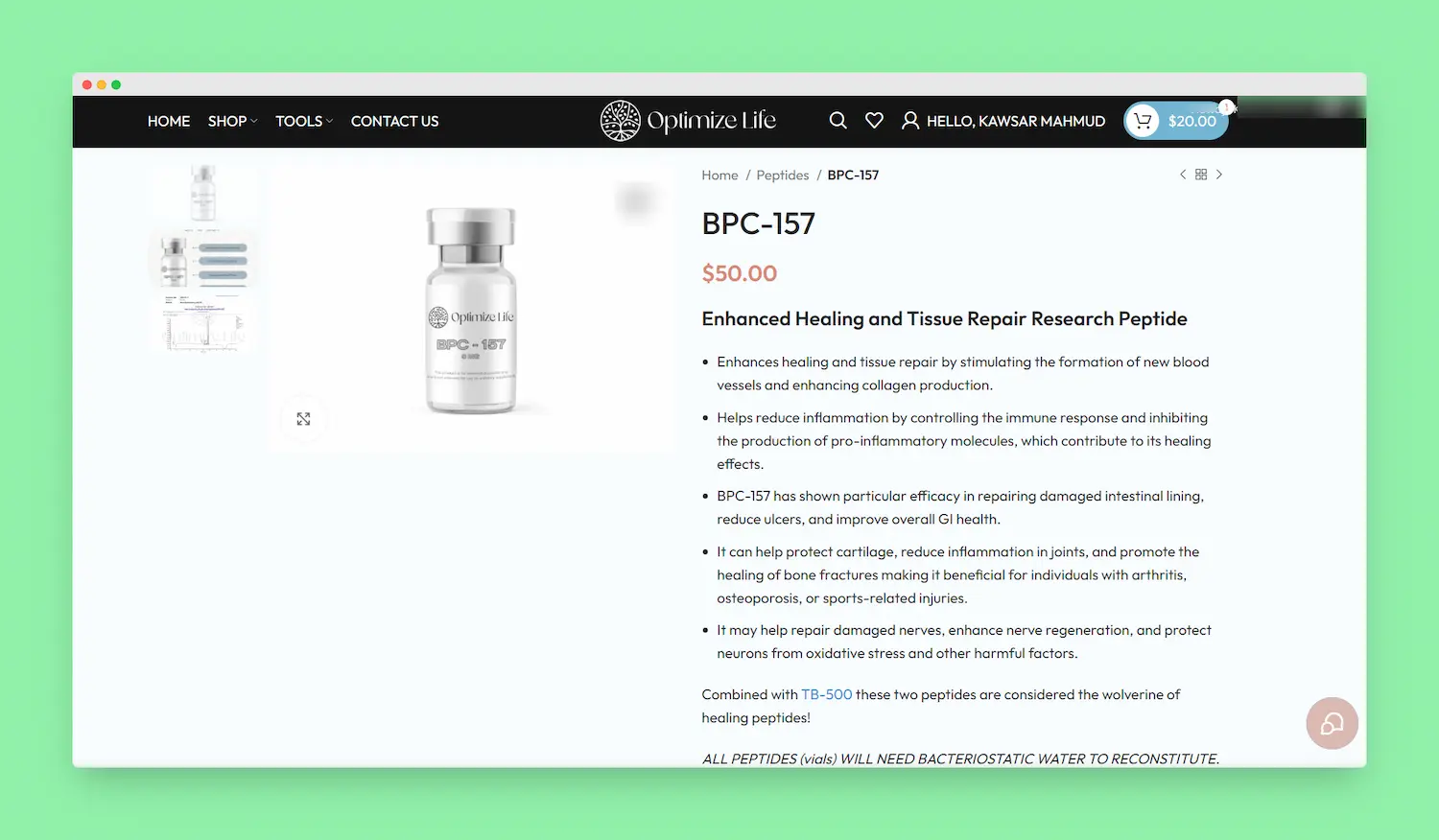Introduction to Peptides
Peptides have become a buzzword in the health, fitness, and skincare industries, but what exactly are they? From anti-aging products to fitness supplements, peptides are at the forefront of innovative solutions to boost our bodies. Let’s break down what peptides are, why they matter, and how they can be used in various fields.
What Are Peptides?
Peptides are short chains of amino acids, which are the building blocks of proteins. Typically, peptides consist of 2 to 50 amino acids, while proteins are made up of 50 or more. These tiny molecules play a massive role in various biological processes, including signaling between cells, tissue repair, and hormone regulation.
Why Are Peptides Important?
Peptides are crucial because they act as messengers in the body. They can influence how your body responds to different stimuli, making them key players in maintaining health, regulating metabolism, and promoting tissue healing. Whether it’s improving skin elasticity or enhancing muscle recovery, peptides are vital for numerous bodily functions.
The Science Behind Peptides
Structure and Composition of Peptides
Peptides are formed when amino acids link together via peptide bonds. This bond is created when the carboxyl group of one amino acid reacts with the amino group of another. The resulting chain can fold into various shapes, giving peptides their unique properties.
How Peptides Differ from Proteins
The primary difference between peptides and proteins is their size. Proteins are larger, more complex molecules made up of many peptide chains. While both are composed of amino acids, peptides have more targeted, specific roles in the body compared to proteins, which perform more broad and structural functions.
Types of Peptides
Natural Peptides
These are peptides that occur naturally in the body. They play essential roles in everything from wound healing to hormone production. Insulin, for example, is a well-known peptide hormone that regulates blood sugar levels.
Synthetic Peptides
Scientists can also create peptides in laboratories. These synthetic peptides mimic the functions of natural peptides and are often used in treatments for a variety of conditions, such as growth hormone deficiency or skin aging.
Peptides in the Human Body
Hormonal Peptides
Hormonal peptides, such as insulin and oxytocin, are critical for regulating metabolic processes and emotional responses. These peptides are involved in everything from controlling blood sugar to promoting feelings of love and bonding.
Popular Human Growth Hormone HGH 191 AA
Neurotransmitter Peptides
Neurotransmitter peptides help regulate mood, memory, and other cognitive functions. Endorphins, for example, are peptides that act as natural painkillers and mood enhancers.
Immunological Peptides
These peptides are involved in the immune system’s defense mechanisms. They help protect the body from infections by signaling immune responses or directly attacking pathogens.
Uses of Peptides in Medicine
Peptides for Anti-Aging
In the anti-aging industry, peptides have gained attention for their ability to boost collagen production, which improves skin elasticity and reduces wrinkles. Peptide-based creams are commonly used in skincare routines for their rejuvenating effects.
Peptides for Muscle Growth and Repair
Bodybuilders and athletes often use peptides to stimulate muscle growth, Longevity, Weight Loss Peptide and accelerate recovery after exercise. Peptides like BPC-157, peptide" target="_blank">Tirzepatide GIP & GLP-1 and HGH 191 AA are known to promote tissue repair, making them popular in sports medicine.
Peptides in Cancer Treatment
Peptide-based drugs are also being explored in cancer treatment. Certain peptides can target cancer cells specifically, delivering drugs directly to the tumor and minimizing damage to healthy tissue.
Peptides in Skincare and Beauty
How Peptides Improve Skin Health
Peptides in skincare products help boost collagen production, increase skin hydration, and reduce fine lines. By signaling the skin to produce more proteins, peptides aid in repairing the skin barrier and promoting a youthful appearance.
Common Peptides Found in Skincare Products
Some popular peptides in the beauty industry include copper peptides, which promote wound healing, and palmitoyl pentapeptide, which is known for its anti-wrinkle effects.
Peptides in Sports and Fitness
Role of Peptides in Athletic Performance
Athletes use peptides to enhance performance and recovery. By promoting the release of growth hormone, peptides help in building lean muscle mass, improving endurance, and speeding up recovery after intense physical activity.
Popular Peptides in the Fitness Industry
Peptides such as CJC-1295 and Ipamorelin are highly popular in the fitness world for their growth hormone-releasing properties. These peptides are often used to improve strength, muscle mass, and overall physical performance.
Benefits of Peptides
Improved Cellular Function
Peptides enhance cellular communication, leading to improved tissue repair and cellular regeneration. This makes them essential for maintaining healthy skin, muscles, and immune function.
Enhanced Recovery and Healing
Peptides are commonly used for their ability to speed up the healing process, whether it’s recovering from an injury or post-workout muscle repair.
Boosted Immune System
Certain peptides can strengthen the immune system by activating immune responses, making the body more resilient to infections and illnesses.
Potential Side Effects of Peptides
Allergic Reactions
Some individuals may experience allergic reactions to certain peptides, which could result in rashes, swelling, or itching. It’s important to conduct a patch test before using peptide-based products.
Overuse and Long-Term Impact
While peptides are generally safe, overuse or misuse can lead to negative side effects such as hormone imbalances. It’s crucial to follow recommended dosages and consult a healthcare professional.
The Future of Peptide Research
Innovations in Peptide-Based Therapies
Peptide research is advancing rapidly, with new peptide-based drugs being developed for a wide range of diseases, including cancer, autoimmune disorders, and metabolic conditions.
Peptides in Personalized Medicine
With the rise of personalized medicine, peptides could play a significant role in creating individualized treatment plans based on a person’s genetic makeup, providing more targeted and effective treatments.
How to Safely Use Peptides
Dosage Guidelines
Using peptides safely involves adhering to recommended dosages. Always start with the lowest effective dose and gradually increase as necessary under the guidance of a healthcare provider.
Importance of Medical Supervision
Since peptides can affect various systems in the body, it’s essential to use them under medical supervision, especially if you are using them for therapeutic purposes or combining them with other medications.
Peptides vs. Other Supplements
Comparing Peptides to Protein Supplements
While both peptides and proteins are essential for muscle repair and growth, peptides offer more specific functions and can target particular processes in the body more effectively.
Are Peptides Better Than Steroids?
Peptides provide many of the muscle-building benefits of steroids without the harmful side effects. They are considered a safer alternative for those looking to enhance muscle growth and performance.
Myths and Misconceptions About Peptides
Common Myths
Some common myths include the belief that peptides are harmful or that they work like steroids. In reality, peptides have a wide range of applications, and their safety largely depends on how they are used.
The Truth Behind Peptide Usage
Peptides are not one-size-fits-all, and their effectiveness can vary depending on the type of peptide and individual needs. They are not magic solutions but powerful tools when used correctly.
How to Choose the Right Peptides
Factors to Consider
When choosing peptides, consider your specific goals, whether it’s for skin health, muscle growth, or recovery. Make sure the peptides are from a reputable source and have been tested for safety and efficacy.
Consult with Experts
Always consult with a healthcare professional before starting any peptide regimen to ensure it is appropriate for your individual needs and health conditions.
Conclusion
Peptides offer a fascinating glimpse into the future of health and wellness. From skincare to muscle growth, and even cancer treatment, these tiny molecules have the power to transform the way we think about healing and maintaining our bodies. With ongoing research and advancements, the potential for peptides is only just beginning to unfold.
FAQs About Peptides
What are peptides made of?
Peptides are made up of short chains of amino acids, the building blocks of proteins.
Are peptides safe for everyone?
While generally safe, peptides should be used under medical supervision, especially for therapeutic use.
How long does it take to see results from peptides?
The timeframe can vary depending on the type of peptide and its purpose, but most users start seeing results within a few weeks.
Can I use peptides in combination with other supplements?
Yes, but it’s always best to consult a healthcare professional to ensure safe and effective use.
What are the most popular peptides?
Some popular peptides include collagen peptides, BPC-157 for healing, and CJC-1295 for muscle growth.


